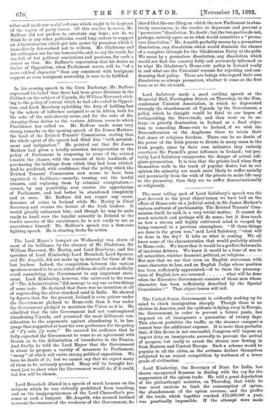In his evening speech in the Corn Exchange, Mr. Balfour
expressed his belief that there bad been grave divisions in the Cabinet on the subject of Uganda, Sir William Harcourt stick- ing to the policy of retreat which he had advocated in Opposi- tion, and Lord Rosebery upholding the duty of holding fast by the sphere of influence assigned to us in Africa, both for the sake of the anti-slavery cause, and for the sake of dis- charging those duties to the various African races to which Providence has called us. Mr. Balfour made some very strong remarks on the opening speech of Sir James Mathew, the head of the Evicted Tenants' Commission, stating that the whole spirit of the speech had filled him "with astonish- ment and indignation." He pointed out that Sir James Mathew had given a totally mistaken interpretation to the policy of Parliament in reopening to some of the evicted tenants the chance, with the consent of their landlords, of purchasing the holdings from which they had been evicted. And he predicted, with confidence, that the policy which the Evicted Tenants' Commission now seems to have been appointed to facilitate,—namely, turning out the lawful tenants, and replacing them by criminal conspirators,— cannot, by any possibility, ever receive the approbation of Parliament, and had better be abandoned completely and at once. Mr. Balfour did not expect any recru- descence of crime in Ireland while Mr. Morley is Chief Secretary and retains the favour of the Irish leaders. It would greatly embarrass him ; and though he may be quite ready to hand over the loyalist minority in Ireland to the tender mercies of the executioner, he is not ready to act as executioner himself. Mr. Balfour's speech was a first-rate fighting speech. He is clearing decks for action.






































 Previous page
Previous page